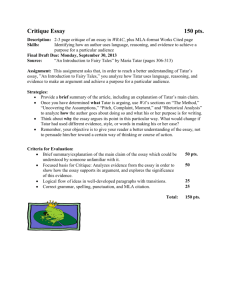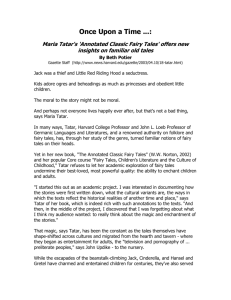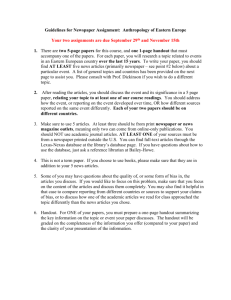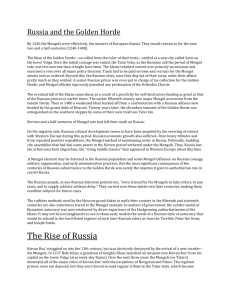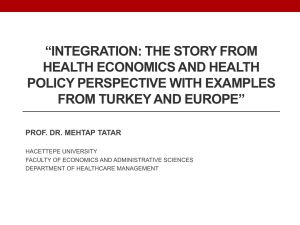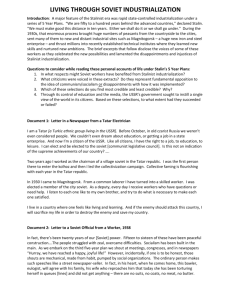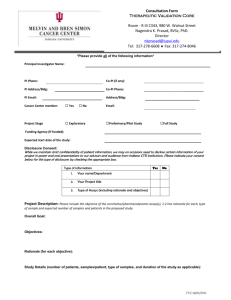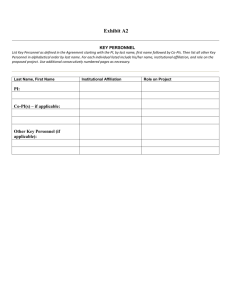Deborah Gail Tatar Education Current Position Honors and Awards
advertisement
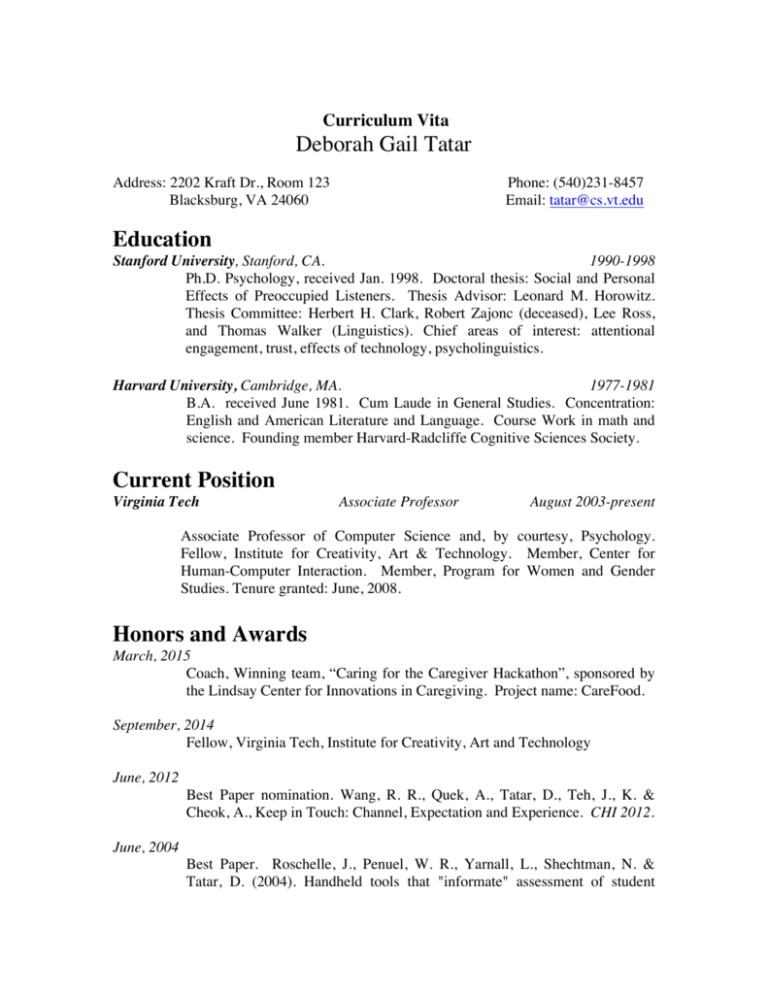
Curriculum Vita Deborah Gail Tatar Address: 2202 Kraft Dr., Room 123 Blacksburg, VA 24060 Phone: (540)231-8457 Email: tatar@cs.vt.edu Education Stanford University, Stanford, CA. 1990-1998 Ph.D. Psychology, received Jan. 1998. Doctoral thesis: Social and Personal Effects of Preoccupied Listeners. Thesis Advisor: Leonard M. Horowitz. Thesis Committee: Herbert H. Clark, Robert Zajonc (deceased), Lee Ross, and Thomas Walker (Linguistics). Chief areas of interest: attentional engagement, trust, effects of technology, psycholinguistics. Harvard University, Cambridge, MA. 1977-1981 B.A. received June 1981. Cum Laude in General Studies. Concentration: English and American Literature and Language. Course Work in math and science. Founding member Harvard-Radcliffe Cognitive Sciences Society. Current Position Virginia Tech Associate Professor August 2003-present Associate Professor of Computer Science and, by courtesy, Psychology. Fellow, Institute for Creativity, Art & Technology. Member, Center for Human-Computer Interaction. Member, Program for Women and Gender Studies. Tenure granted: June, 2008. Honors and Awards March, 2015 Coach, Winning team, “Caring for the Caregiver Hackathon”, sponsored by the Lindsay Center for Innovations in Caregiving. Project name: CareFood. September, 2014 Fellow, Virginia Tech, Institute for Creativity, Art and Technology June, 2012 Best Paper nomination. Wang, R. R., Quek, A., Tatar, D., Teh, J., K. & Cheok, A., Keep in Touch: Channel, Expectation and Experience. CHI 2012. June, 2004 Best Paper. Roschelle, J., Penuel, W. R., Yarnall, L., Shechtman, N. & Tatar, D. (2004). Handheld tools that "informate" assessment of student learning in science: A requirements analysis. Proceedings of the Second IEEE International Workshop on Mobile and Wireless Technologies in Education, JungLi, Taiwan, pp. 149-153. Reprinted Journal of ComputerAssisted Learning, 21(3), pp.190-203. January 1995 Research grant, Center for Conflict and Negotiation, Stanford University June 1992 - August 1992 Summer fellowship. Center for the Study of Language and Information, Stanford University. September 1994 - September 1995 Stanford Graduate Fellowship, Stanford University. September 1990 - September 1992, September 1993- 1994 National Science Foundation graduate student fellowship. June 1981 Radcliffe College Elizabeth Cary Agassiz Certificate of Merit for high academic achievement. PUBLICATIONS Books and Monographs 1. Tatar, D. A Programmer's Guide to Common LISP. 1986. Digital Press: (Bedford, MA). 337 pages. A text on the Common LISP programming language aimed at advanced and experienced programmers. Translated into Japanese. Book Chapters 1. Yglesias, S., Tatar, D., Harrison, S. and Lee, J. S. (in press) Balancing Behaviors: A Design Phenomenology for Couples’ Argumentation Via Different Media. In (S. Tettagh, Ed.) Emotions and Technology. Amsterdam: Elsevier. 2. Dickey-Kurdziolek, M. and Tatar, D. (2012) “They Need to be Solid in Standard Skills First”: How Standards Can Become the Upper Bound, In (S. Hegedus and J. Roschelle, Eds.) The SimCalc Vision and Contributions: Democratizing Access to Important Mathematics. Dordrecht: Springer. p. 299-318 3. Harrison, S., and Tatar, D. (2012). “Design and the Third Paradigm” in Hartson, R., and Pyla, P. The UX Book: Process and Guidelines for Ensuring a Quality User Experience, Morgan Kaufmann, p. 254-256 4. Burge, J., and Tatar, D. (2009) Affect and Dyads: Conflict across Different Technological Media. In (S. Harrison, Ed.) Media Spaces: 20+ Years of Mediated Life. New York: Springer-Verlag. p. 127-146. 5. Roschelle, J., Tatar, D. and Kaput, J. (2008) Getting to scale with innovations that deeply restructure how students come to know mathematics and science. In Kelly, E. A. and Lesh, R. (Eds.) Handbook of design research in mathematics, science and technology education. Mahwah, NJ: Erlbaum. pp. 149-171. 6. Patton, C., Tatar, D. and Dimitriadis, Y. (2008) Trace Theory, Coordination Games, and GroupScribbles. In (J. Voogt and G. Knezek, Eds.) International Handbook of Information Technology In Primary and Secondary Education. New York: Springer. 7. Tatar, D., Lin, S. and Lee, J.S. Playground Games and the Dissemination of Control in Computing and Learning (2008). In (DiGiano, C., Goldman, S. & Chorost, M., Eds.) Educating Learning Technology Designers. Mahwah, New Jersey: Lawrence Erlbaum Associates. p. 230-257 8. Roschelle, J., Patton, C. and Tatar, D. (2007) Designing Networked Handheld Devices to Enhance School Learning. In (M. Zelkowitz, Ed.) Advances in Computing, New York: Academic Press, 70, p. 2-52. 9. Vahey, P., Tatar, D. and Roschelle, J. (2006) Using Handheld Technology to Move Between the Private and Public in the Classroom. In van't Hooft, M. A., & Swan, K. (Eds.) Ubiquitous computing: Invisible technology, visible impact. Mahwah, NJ: Erlbaum. pp. 187-210 10. Gray, J. and Tatar, D. (2004) Sociocultural Analysis of Online Professional Development: A Case Study of Personal, Interpersonal, Community, and Technical Aspects in Barab, S.A., Kling, R., & Gray, J. H. (Eds.). Designing for Virtual Communities in the Service of Learning. New York: Cambridge University Press. pp. 404-436. 11. Tatar, D., Foster, G. and Bobrow, D. (1991). Design for Conversation: lessons from Cognoter. International Journal of Man-Machine Studies, 34(1), pp. 185-209. Reprinted in Ronald M. Baecker (Ed.) Readings in Groupware and ComputerSupported Cooperative Work. 1993. Morgan Kaufman (San Mateo, CA). pp. 596608 12. Stefik, M., Foster, G., Bobrow, D., Tatar, D. and Lanning, S. (1987). WYSIWIS Revised: Experiences with Multi-user Interfaces. ACM Transactions on Office Information Systems, 5:2, pp. 147-167 (April 1987); Proceedings of the Computer Supported Cooperative Work Conference, Austin TX (December 1986), pp 276290. Reprinted in Ronald M. Baecker (Ed.) Readings in Groupware and Computer-Supported Cooperative Work. 1993. Morgan Kaufman (San Mateo, CA). pp. 585-595 Dissertation and Theses 1. Tatar, D. Social and Personal Effects of Preoccupied Listeners. Ph.D. Dissertation. Dept. of Psychology, Stanford University, 1998. Refereed Journals 1. Tatar, D., Roschelle, J. and Hegedus, S. (2014) SimCalc Mathworlds® Democratizing Access to Advanced Mathematics, International Journal of Designs for Learning, Special Issue on Historic Cases (C. Gray and S. Howard, Eds.) 5(2) 83-100. 2. Hegedus, S., Dalton, S., Roschelle, J., Penuel, W., Dickey-Kurdziolek, M., Tatar, D. (2014) Investigating Why Teachers Continued Use and Sharing of an Educational Innovation After the Research has Ended. Mathematical Thinking and Learning, 16:4, 312-333. 3. Kavanaugh, A., Puckett, A, and Tatar, D. (2013) Scaffolding Technology for Low Literacy Groups: From mobile phone to desktop PC? International Journal of Human-Computer Interaction, 29(4), p. 274-288 4. Sengers, P., Harrison, S. and Tatar, D. (2011) Making Epistemological Trouble: Third-Paradigm HCI as Successor Science, Interacting with Computers: Special Issue: Feminism and HCI (S. Bardzell and E. Churchill, Eds.), 23(5), p. 385-392 5. Roschelle, J., Shechtman, D. Tatar, D., Hegedus, S., Hopkins, B., Empson, S., Knudsen, J., and Gallagher, L. (2010) Integration of Teacher Training, Curriculum and Technology for Advancing Middle School Mathematics: Three Large-Scale Studies. American Educational Research Journal. 47(4) 833-878. 6. Harrison, S. and Tatar, D. (2008) People, Events, Loci: The relation of semantic frames in mediated experience. Journal of Computer-Supported Cooperative Work, Special Issue on Place. (L. Ciolfi, L. Bannon and G. Fitzgerald, Eds.) 17:197-133 7. Roschelle, J., Tatar, D., Shechtman, N., Knudsen, J. (2008) The role of scaling up research in designing for and evaluating robustness. Educational Studies in Mathematics, Special Issue on Democratizing Access to Mathematics through Technology: Issues of Design, Theory and Implementation— In Memory of James Kaput (S. Hegedus and R. Lesh, Eds.). 68(2), p. 149-170 8. Tatar, D., Roschelle, J., Knudsen, J., Shechtman, N., Kaput, J. & Hopkins, B. (2008) Scaling Up Innovative Technology-Based Math. Journal of the Learning Sciences. 17(2) p. 248-286 9. Tatar, D., Harrison, S., Crandell, A., & Schaefer, M. (2008). Using place as provocation: In situ collaborative narrative construction. RCETJ, 4 (1). Retrieved January 2, 2009, from http://www.rcetj.org/?type=art&id=87830& 10. Tatar, D. (2007) The Design Tensions Framework. Journal of Human-Computer Interaction. 22(4), p. 413-451. 11. Roschelle, J., Tatar, D., Chaudhury, S. R., Dimitriadis, Y., Patton, C. & diGiano, C. (2007) Ink, Improvisation and Interactive Engagement: learning with tablets. IEEE Computer, 40(9), 42-48 12. Penuel, B., Tatar, D., and Roschelle, J. (2004) The Role of Research on Contexts of Teaching Practice in Informing the Design of Handheld Learning Technologies. Journal of Educational Computing Research. 30(4), p. 353-370 13. Roschelle, J., Penuel, W. R., Yarnall, L., Shechtman, N. & Tatar, D. (2004). Handheld tools that "informate" assessment of student learning in science: A requirements analysis. Journal of Computer-Assisted Learning, 21(3), pp.190203. Reprinted from Proceedings of the Second IEEE International Workshop on Mobile and Wireless Technologies in Education, JungLi, Taiwan. pp. 149-153. Voted Best-Paper. 14. Jucks, R., Paechter, M.R., and D. Tatar, (2003) Learning and Collaboration in Online Discourses. International Journal of Educational Policy, Research & Practice, 4(1), p. 117-147 15. DiGiano, C., Patton, C., Roschelle, J., Tatar, D., Yarnall, L., Manley, M. (2003) Collaboration Design Patterns: Conceptual Tools for Planning for The Wireless Classroom. Re-printed in Journal of Computer-Assisted Learning, 19(3), pp. 284297. Proceedings of the IEEE International Workshop on Wireless and Mobile Technologies in Education, 2002, p. 39-47 16. Tatar, D., Roschelle, J., Vahey, P. and Penuel, W. (2003) Handhelds Go to School. IEEE Computer, 36(9), p. 30-37 17. Horowitz, L., Krasnaperova, E., Tatar, D., and Nelson, K. (2001) The Way to Console Depends on the Goal. Journal of Experimental Social Psychology. 37, p. 49-61 18. Pratto, F., Tatar, D. and Conway-Lanz, S. (1999) Who Gets What and Why: Determinants of Social Allocation. Political Psychology, 20(1), p. 127-150 19. Reeves, B., Lang, A., Kim, E. Y. and Tatar, D. (1999)The Effects of Screen Size and Viewer Contents on Attention and Arousal. Journal of Media Psychology, 1(1), p. 49-67 20. Tatar, D., Foster, G. and Bobrow, D. (1991). Design for Conversation: lessons from Cognoter. International Journal of Man-Machine Studies, 34(2), p. 185-209. Reprinted in Ronald M. Baecker (Ed.) Readings in Groupware and ComputerSupported Cooperative Work. 1993. Morgan Kaufman (San Mateo, CA). p. 596608 21. Stefik, M., Foster, G., Bobrow, D., Tatar, D. and Lanning, S. (1987). WYSIWIS Revised: Experiences with Multi-user Interfaces. ACM Transactions on Office Information Systems, 5(2) pp.147-167; Proceedings of the Computer Supported Cooperative Work Conference, Austin TX (December 1986), p. 276-290. Reprinted in Ronald M. Baecker (Ed.) Readings in Groupware and ComputerSupported Cooperative Work. 1993. Morgan Kaufman (San Mateo, CA). p. 585595 Refereed Conference Proceedings (Full Papers) 1. Lee, J.S. and Tatar, D. (2014) Sounds of Silence: Exploring Contributions to Conversations, Non-Responses and the Impact of Mediating Technologies in Triple Space, In Proceedings of the 2014 conference on Computer supported cooperative work (CSCW '14). ACM, New York, NY, USA, p. 1561-1572 2. Lee, J.S. and Tatar, D. (2013) Impact of Mediating Technologies on Talk and Emotion: Questioning "Commonsense" In Proceedings of the Conference on Collaborative Computing: Networking, Applications and Worksharing (CollaborateCOM '13), Austin, Texas, USA, p. 380-389 3. Lee, J.S. and Tatar, D. (2013) Form factor matters. In Proceedings of the 2013 conference on Computer supported cooperative work (CSCW '13). ACM, New York, NY, USA, 1481-1486. DOI=10.1145/2441776.2441944 http://doi.acm.org/10.1145/2441776.2441944 4. Wang, R. R., Quek, F., Tatar, D., Teh, J., K. & Cheok, A., Keep in Touch: Channel, Expectation and Experience. CHI 2012 (Best Paper nomination), p. 139-144 5. Lee, J. S., Tatar, D., Pedersen, E. (2012) Time, Topic, Trawl: Stories about how we reach our past, DIS 2012, p. 234-243 6. Dickey-Kurdziolek, M., Tatar, D., Harrison, S. (2012) Framespaces: Framing of Frameworks, DIS 2012, p. 278-278 7. Lee, J. S., Branham, S., Tatar, D. and Harrison, S. (2012) Processlessness: Staying Open to Interactional Possibility. DIS 2012, p. 78-81 8. Lee, J.S., Tatar, D. and Harrison, S. (2012) Micro-coordination: because we did not already learn everything we need to know about working with others in kindergarten. CSCW ’12, p. 1135-1144 9. Lee, J. S., Tatar, D. (2012) Good Enough Pointing in Pervasive Computing, 2012 International Conference on Collaboration Technologies and Systems (CTS 2012), p. 330-337 10. Kafura, D., Tatar, D. (2011) Initial Experience with a Computational Thinking Course for Computer Science Students. Proceedings of the 42nd ACM Technical Symposium on Computer Science Education (sigCSE’11), p. 251-257 11. Lin, S., Tatar, D. (2011) Encouraging Parallel Thinking Through Explicit Coordination Modeling. Proceedings of the 42nd ACM Technical Symposium on Computer Science Education (sigCSE’11). p. 441-446 12. Way, T., Cassel, L., Pearson, K., Wolz, U., Tatar, D., & Harrison, S. (2010). A Distributed Expertise Model for Teaching Computing Across Disciplines and Institutions. In The 2010 International Conference on Frontiers in Education: Computer Science and Computer Engineering. July 12-15, 2010, Las Vegas, Nevada, USA. CSREA Press 2010, ISBN 1-60132-143-0 13. Beaton, R., Harrison, S., Tatar, D. (2010) Digital Drumming: A study of co-located highly coordinated dyadic collaboration. SigCHI 2010, p. 1427-1436 14. Roschelle, J., Pierson, J., Empson, S., Shechtman, N., Dunn, M. and Tatar, D. (2010) Equity in Scaling Up SimCalc: Investigating Differences in Student Learning and Classroom Implementation, International Conference of the Learning Sciences, June 27-July 1, 2010, Chicago, IL. p. 333-340. 15. Dickey-Kurdziolek, M., Schaefer, M., Tatar, D. and Renga, I. (2010) Lesson from ThoughtSwap-ing: Increasing Participant’s Coordinative Agency in Facilitated Discussion. CSCW 2010, Feb. 6-10, Savannah, GA. p. 81-90. 16. Roschelle, J., Shechtman, N., Hegedus, S., Pierson, J., McLeese, M., Tatar, D. (2008) Cognitive Complexity in Mathematics Teaching and Learning: Emerging Findings in a Large-Scale Experiment. Proceedings of the International Conference of the Learning Sciences. June 24-28, 2008. Utrecht, Netherlands, p. 271-278 17. Tatar, D., Lee, J.S. and Alaloula, N. (2008) Playground Games: A design strategy for supporting and understanding coordinated activity. Proceedings of the Conference on the Design of Interactive Systems (DIS 2008), 2008. February 25-27, 2008. Capetown, South Africa, p. 68-77 18. Roschelle, J., Tatar, D., Shechtman, N., Hegedus, S. (2008) Using an Integration of Technology, Curriculum, and Teacher Professional Development at Scale to Improve Student Learning of Important Middle School Mathematics, Society for Research on Educational Effectiveness (SREE), March 2-4, Crystal City, Virginia. 19. Harrison, S., Back, M., & Tatar, D. (June, 2006) “It’s Just a Method”: A Pedagogical Experiment in Interdisciplinary Design. Proceedings of Design for Interactive Systems 2006 (DIS 2006), June 26-28. Penn State University, State College Pennsylvania, ACM Press. p. 261-270. 20. Brecht, J., DiGiano, C., Patton, C., Davis, K., Roschelle, J., Tatar, D. (2006). Coordinating networked learning activities with a general-purpose interface. Proceedings of mLearn 2006, the 5th World Conference on Mobile Learning. 21. DiGiano, C., Tatar, D. and Kireyev, K. (2006), "Learning from the Post-It: Building Collective Intelligence through Lightweight, Flexible Technology," Conf. suppl. ACM SIG Conf. Computer-Supported Cooperative Work (CSCW 2006), ACM Press, pp. 65–66. 22. Kim, K., Tatar, D. and Harrison, S. (November, 2006) Handheld-Mediated Communication to Support the Effective Sharing of Meaning in Joint Activity. WMUTE 2006, The 4th IEEE International Conference on Advanced Learning Technologies, November 17-18. Athens Greece. p. 82-89. 23. Roschelle, J., Schank, P., Brecht, J., Tatar, D., Chaudhury, S.R. (November, 2005) From Response Systems to Distributed Systems for Enhanced Collaborative Learning, International Conference on Computers and Education 2005 (ICCE 2005). November 28-Dec. 2. Nanyang Technological University, Singapore. IOS Press, p. 363-370. 24. Kim, K. & Tatar, D. (2005) Weak Guidance with “Look” Functionality in Handheldbased Classroom Activities. Proceedings of the 2005 Conference on ComputerSupported Collaborative Learning, Taipei, Taiwan, May 29-June 4, 2005. p. 296300. 25. Tatar, D., Lin, S., Dickey, M. (2005) Visualizing Handheld-Based Classroom Activity. Proceedings of the 2005 International Symposium on Collaborative Technologies and Systems. St. Louis, MS, May 15-19, 2005. p. 313-320 26. Vahey, P., Tatar, D., and Roschelle, J. (2004) Leveraging Handhelds to Increase Student Learning: Engaging Middle School Students with the Mathematics of Change. Proceedings of the Sixth International Conference of the Learning Sciences. Los Angeles, CA, June 22-26, 2004. p. 553-560 27. Kim, K. and Tatar, D. (2004) Designing knowledge management systems: reuse and integration of findings in computer supported cooperative work. IRI 2004. Proceedings of the 2004 IEEE Conference on Information Reuse and Integration, 2004. p. 338-343 28. Roschelle, J., Penuel, W. R., Yarnall, L., Shechtman, N. & Tatar, D. (2004). Handheld tools that "informate" assessment of student learning in science: A requirements analysis. Proceedings of the Second IEEE International Workshop on Mobile and Wireless Technologies in Education, JungLi, Taiwan. pp. 149153. Voted Best-Paper. Reprinted in Journal of Computer-Assisted Learning, 21(3), pp. 190-203. 29. Roschelle, J., Vahey, P., Tatar, D., Kaput, J., & Hegedus, S. J. (2003). Five key considerations for networking in a handheld-based mathematics classroom. In N. A. Pateman & B. J. Dougherty & J. T. Zilliox (Eds.), Proceedings of the 2003 joint meeting of PME and PMENA (Vol. 4, pp. 71-78). Honolulu, Hawaii: University of Hawaii. 30. DiGiano, C., Patton, C., Roschelle, J., Tatar, D., Yarnall, L., Manley, M. (2003) Collaboration Design Patterns: Conceptual Tools for Planning for The Wireless Classroom. Proceedings of the IEEE International Workshop on Wireless and Mobile Technologies in Education, 2002, pp. 39-47. Re-printed in Journal of Computer-Assisted Learning, 19(3), 284-297 Refereed Conference Proceedings (Short Papers) 31. Dimitriadis, Y., Asensio-Pérez, J.iI, Hernández-Leo, D., Roschelle, J., Brecht, J., Tatar, D., Chaudhury, S. R., diGiano, C., & Patton, C. (2007) From sociallymediated to technology-mediated coordination: A study of design tensions using Group Scribbles, Conference on Computer Supported Collaborative Learning 2007. p. 161-164 32. Kim, K., Tatar, D. and Harrison, S. (2007) Sharing Visual Context to Facilitate Late Overhearers’ Understanding of the Handheld-Based Learning Activity, Conference on Computer-Supported Collaborative Learning 2007. p. 364-367 33. Lin, S., Tatar, D., Harrison, S., Roschelle, J. & Patton, C. (2006) Learning When Less is More: “Bootstrapping” Undergraduate Programmers as Coordination Designers. PDC 2006 Proceedings of the Participatory Design Conference, Trento Italy, August 1-5, 2006. p. 133-136. 34. Tatar, D., Grey, J. and Fusco, J. (2002) Rich Social Interaction in an Online Community for Learning. In Electronic Proceedings of the Conference on Computer-Supported Cooperative Learning. January, 2002 (Bloomington CO) 35. Mackay, W., Guindon, R., Mantei, M., Suchman, L., Tatar, D. (1988) Video: Data for Studying Human-Computer Interaction. In Proceedings of the SigCHI Conference on Human Factors in Computing Systems. May, 1988 (Washington, D.C.) pp. 133-137. 36. Tatar, D. (1987) Colab, A New Medium for Communication and Cooperation. International Conference on Computers and Information, December 1987 (Pittsburgh, PA) Other Refereed Publications and Presentations 1. Tatar, D. (2014) Gender and STEM: No Shift Required, XVIII ISA World Congress of Sociology, Yokohama, Japan, July 13-19, 2014. 2. Lin, S. and Tatar, D. (2010) Beyond Current Social Computing: Challenges to Complex Coordinated Systems Design, CSCW Horizons, Savannah Georgia, Feb. 6-10, 2010 3. Schaefer, M., Harrison, S., Tatar, D. (2010) Can CSCW Technologies Help Us Reconstruct Places?, CSCW Horizons, Savannah Georgia, Feb. 6-10, 2010 4. Fishman, B., Penuel, W., Hegedus, S., Tatar, D., Dickey, M., Moniz, R., Salton, S., Brookstein, A., and Roschelle, J. (2009) What happens when the research ends?: Factors related to the sustainability and scalability of a research-based innovation. AERA 2009 5. McLeese, Michelle and Deborah Tatar. "Teacher Control and Student Academic Outcomes: A Qualitative Analysis of a Technological Mathematical Intervention in Texas." Southern Sociological Society Meetings April 1-4, 2009 New Orleans, LA. 6. Tatar, D., Harrison, S. (2009) The Three Paradigms of HCI. Human-Computer Interaction Consortium. February 2-February 7, Frazer, Colorado. 7. Tatar, D. and Dickey-Kurdziolek (2008) Beyond Simple Evaluation: The case of an effective classroom technology and its prospects for impact. Human-Computer Interaction Consortium. January 30-February 3, Frazer, Colorado. 8. Stroter, A. and Tatar, D. (2008) Teacher-Student Racial and Ethnic Congruence: Race Still Matters in the Classroom, American Educational Research Association (AERA) 2008, New York, NY, March 24-28 9. Tatar, D., Ravitz, J., Stroter, A. & Zin, T. (2008) Recruiting for a Rigorous Experimental Study in Education American Educational Research Association (AERA) 2008, New York, NY, March 24-28 10. Roschelle, J., Shechtman, N. & Tatar, D. (2008) Enhancing Mathematics Learning with Technology: Civic, Teacher, Student and Content Perspectives on Scaling Up SimCalc, American Educational Research Association (AERA) 2008, New York, NY, March 24-28 11. Roschelle, J., Tatar, D., Empson, S.E., Hegedus, S. & Hopkins, B. (2008) Mapping “Geography of Opportunity” in a Large Scale Randomized Experiment on Enhancing Mathematics with Technology, American Educational Research Association (AERA) 2008, New York, NY, March 24-28 12. DiGiano, C., Tatar, D. and Kireyev, K. (2006), "Learning from the Post-It: Building Collective Intelligence through Lightweight, Flexible Technology," Conf. suppl. ACM SIG Conf. Computer-Supported Cooperative Work (CSCW 2006), ACM Press, pp. 65–66. 13. Kim, K. and Tatar, D. (July, 2006) The Effects of Handheld Network Service, “LOOK”, on the Acquisition of Common Ground, Society for Text and Discourse 2006 (extended abstract). 14. Tatar, D. and Burge, J. (July, 2006) Communication Media and Dyadic Conflict, Society for Text and Discourse 2006 (extended abstract). 15. Roschelle, J., Tatar, D. and Kaput, J. (April, 2006) Getting to scale with innovations that deeply restructure how students come to know mathematics and science, American Educational Research Association Meeting, April 8-12. San Francisco, CA. 16. Harrison, S. & Tatar, D. (March, 2006) More than a Method. Human Computer Interaction Educators Workshop 2006, March 25-28. Limerick, Ireland. 17. Roschelle, J., Tatar, D., Kaput, J. & Hopkins, B. (2005) Scaling Up Innovative Technology-Based Math With a Wide Variety of 7th Grade Teachers, National Conference of Teachers of Mathematics, April 2005, San Diego, CA. (Extended abstract) 18. Tatar, D. (2005) Pragmatics of Emotional Computing: Emotion in Mediated Communication. Human-Computer Interaction Conference. Boulder, CO., January, 2005. (Extended abstract) 19. Roschelle, J., Tatar, D., Hopkins, B., Kaput, J., Shechtman, N. (2004) Scaling Up Restructuring Knowing: From Design Experiments to Experimental Design. American Educational Research Association. (Abstract) 20. Vahey, P., & Tatar, D. (2004). Designing Representation-Rich, Wireless Handhelds for Teaching Mathematics. American Educational Research Association. San Diego, CA. (Abstract) 21. Vahey, P., Tatar, D., Roschelle, J. (2003) Emerging Themes in Peer-to-Peer Collaboration Over Rich Representations. National Council of Teachers of Mathematics, April 9, 2003, San Antonio, TX. (Extended abstract) 22. Tatar, D., Vahey, P. and Roschelle, J. (2003) Beaming, Teaming and Talk: Handheld Wireless Math Meets Middle School Sociality, National Council of Teachers of Mathematics, April 9, 2003, San Antonio, TX. (Extended abstract) 23. Tatar, D., Fusco, J. and Gray, J. (2003) Learning and Collaboration in Online Discourses, American Educational Research Association, April 2003, Fort Lauderdale, FL. (Poster presentation) 24. Tatar, D. (2003) Using Artifacts in a Virtual Seminar, American Educational Research Association, April 2003, Fort Lauderdale, FL. (Poster presentation) 25. Tatar, D., Fusco, J. and Gray, J. (2002) Rich Social Interaction in Online Communities for Learning, Computer Supported Collaborative Learning, January 2002, Bloomington, CO. (Poster presentation) 26. Gray, J. and Tatar, D. (2001) Online Learning Communities in Sociocultural Contexts: Four Planes of Analysis, American Educational Research Association, Seattle, WA, April 10-14, 2001. (Poster presentation) 27. Tatar, D. (1998) Attentional Engagement. Society for Interpersonal Psychology, June 1998, Snowbird, Utah. (Poster presentation) 28. Tatar, D. (1998) Listening and Shyness. Anxiety Disorders Association of America, March 1998, Boston, MA. (Poster Presentation) 29. Tatar, D. (1996) Social and Personal Consequences of a Preoccupied Listener. Stanford-Berkeley Social and Personality Talks, May 1996, Stanford, CA. (poster Presentation) Invited Contributions 1. Tatar, D. (May/June 2014) Reflecting Our Better Natures. ACM Interactions, feature column. http://interactions.acm.org/archive/view/may-june-2014/reflecting-ourbetter-nature. 2. Tatar, D. (on-going) ACM Interactions blog post. First submission, January, 2013. Accessible at: http://interactions.acm.org/blog/author/7252/Deborah%20Tatar 3. Tatar, D. (2013), "Gender And STEM: No Shift Required" (White Paper). SEAD (Science, Engineering, Art and Design) Network Initiative (under National Science Foundation Grant No.1142510). URL: http://seadnetwork.wordpress.com/white-paper-abstracts/draft-white-papers-forcomment/gender-and-stem-no-shift-required/. Editor and Guest Editor Positions 1. Branham, S., Thieme, A., Nathan, L. and Tatar, D. (in progress) Co-Constructing Meaning: Ethics Matter(s) in Design Research. Special issue of Interacting with Computers. 2. Tatar, D. Proceedings Editor, Conference on Computer Supported Cooperative Work, 1990 3. Guest Editor, with W. Mackay, SigCHI bulletin, Special Issue on Video as a Research and Design Tool (October, 1989) 4. Tatar, D. Proceedings Editor, Conference on Computer Supported Cooperative Work, 1988 Technical Reports and Other Non-Peer Reviewed Output 1. Harrison, S. and Tatar, D. (2011). “On methods”. ACM Interactions 18, 2 (March 2011), 10-11. ACM, New York, NY, http://doi.acm.org/10.1145/1925820.1925823 2. Roschelle, J., Tatar, D., Shechtman, N., Hegedus, S., Hopkins, B., Knudsen, J. and Stroter, A. (2008) Can a technology-enhanced curriculum improve students learning of important mathematics? Technical Report 01, SRI International, www.math.sri.com 3. Mackay, W. and Tatar, D. (1989). Introduction to the Special Issue on Using Video as a Research and Design Tool. SigCHI Bulletin, October 1989, 21(2), pp. 48-50. 4. Tatar, D. (1989) Using Video-Based Observation to Shape the Design of a New Technology. SigCHI Bulletin, October 1989, 21(2), pp. 108-111. Additional Scholarly Output: Invited Talks and Conference Presentations 1. Lee, Joon-Suk, Tatar, D., Harrison, S. (2015) Triple-Space Interaction: A Framework for Face-to-Face Collaboration. Local-Remote Collaboration: Applying Remote Group Awareness Techniques to Co-located Settings Workshop, CSCW 2015, March 15, 2015; Vancouver Canada. 2. Stewart, M. Tatar, D., Harrison, S. (2015) Co-listening for Local and Remote Collaborators. Local-Remote Collaboration: Applying Remote Group Awareness Techniques to Co-located Settings Workshop, CSCW 2015, March 15, 2015; Vancouver Canada. 3. Tatar, D. and Harrison, S. (2014) Power, Obligation, Design. Design decisions and the sharing of power in PD Workshop, PDC 2014, October 6, 2014; Windhoek Namibia. 4. Harrison, S. and Tatar, D. Computational Thinking, a two-day seminar, September 12, 2014. Aarhus Universitet. Aarhus, Denmark. 5. Tatar, D., Harrison, S. (2014) Technology and (Gendered) Power. Gender, Bodies and Technology, VT, May 2014. 6. Nathan, L. and Tatar, D. (2014) Pessa-Kucha on Workshops, DIS Conference, June 2014, Vancouver, Canada. 7. Tatar, D. (2014) Joint Ownership, Choices and Challenges Forum, VT, February, 2014. 8. Tatar, D. and Harrison, S. (2013) Co-Design with School Teachers: Explorations in an over-constrained setting, Participatory IT, Universitet, Denmark, September, 2013. 9. Harrison, S. and Tatar, D., “Co-Design with School Teachers Explorations in an over-constrained setting”, Mobile Life (KTH, Stockholm University, and Ericsson Telephone), Stockholm Sweden, Nov, 2013 10. Tatar, D. & Harrison, S., “Creating a Basis for Teaching Ethics to Computer Scientists”, CPATH Meeting. Villanova University, PA. June 3, 2013. 11. Harrison, S. & Tatar, D. “Multi-level Interlocking Collaborative Design”, CPATH Meeting. Villanova University, PA. June 3, 2013. 12. Tatar, D. (2013) Microcoordination: a lens for studying the design of collaborative phenomena, Universitat Pompeu Fabra Department of Communications Technologies. January 12, 2013. 13. Tatar, D. (2012) Microcoordination: a lens for studying the design of collaborative phenomenon. Stanford Human-Computer Interaction Seminar. January 17, 2012, Stanford California. Retrieved at: http://myvideos.stanford.edu/player/slplayer.aspx?coll=45ddfd4c-930b-48dc9568-5723608d6cba&s=true 14. Tatar, D. (2012) Computational Thinking: Yours, mine or ours? Indiana University. March 8, 2012, Bloomington Indiana. 15. Tatar, D. and Dickey-Kurdziolek, M. (2012) Changing Education by ThoughtSwapping. Cultivating Ensembles in STEM Education and Research. January 5, 2012, Hartford Connecticut. 16. Tatar, D. (2010) The Design of Control: Influencing identity and responsibility in education, collaborative narrative development and play. Gender, Bodies and Technology Conference. April 22-24, 2010, Roanoke Virginia. 17. Tatar, D. (2009) Playground Games and the Diminution of the Feminine in the Age of Technology. Through Feminist Eyes. October 5, 2009. 18. Tatar, D. (May, 2007) Practice Into Theory: from serious work about learning in classroom environments to serious questions about the playful nature of control and coordination in computing. Invited Keynote Speech. First Annual Conference on Pen-based Learning Technologies, May 24-25, 2007, Catania, Italy. 19. Tatar, D. (May, 2007) Design Tensions in Learning Technologies: Creating, exploring and promoting classroom systems for equity, excellence, and human values. Invited talk, Stanford University, School of Education. May 7, 2007. 20. Harrison, S., Tatar, D. and Sengers, P. (April, 2007) The Three Paradigms of HCI. Alt.chi Presentation, at SigCHI 2007, San Jose, CA. April 28, 2007. 21. Tatar, D. (March, 2007) Practice Into Theory: from serious work about learning in classroom environments to serious questions about the playful nature of control and coordination in computing. Invited talk, University of Washington, Seattle, Information School. March 8, 2007. 22. Tatar, D. (January, 2007) Practice Into Theory: from serious work about learning in classroom environments to serious questions about the playful nature of control and coordination in computing. Invited talk, University of Illinois, Chicago, Department of Computer Science. January 28, 2007. 23. Tatar, D. (2006) Scaling Up SimCalc: Educational Research that Makes a Difference. Invited Talk, Interagency Educational Research Initiative Principle Investigator’s Meeting, Arlington, VA, August 31, 2006. 24. Tatar, D. & Lin, Sirong (April, 2006) Playground Games and the Dissemination of Control in Teaching and Learning. Invited Talk, Penn State University Information Sciences and Technology School, April 17, 2006. 25. Vahey, P., Tatar, D., & Crawford, V. (2003). Autonomy and Collaboration: An Emerging Theme in Handheld use in K-12 Education. Presentation at the UC Berkeley School of Education, Berkeley, CA, April, 2003. 26. Tatar, D. (2000) Read All About It: An eyetracking study of online news reading, Berkeley SIMS, Graduate Class on Quantitative Methods, November 3, 2000. 27. Tatar, D. (1989) What We Need to Know to Build Groupware, Santa Clara University, Graduate Seminar in Computer Science, Santa Clara, CA,October 1989. 28. Tatar, D. (1989) A Preliminary Report on Using Video to Shape the Design of a New Technology, Workshop on Video as a Research and Design Tool, Boston, MA, January 1989. 29. Tatar, D. (1987) Colab. Invited Talk, Open University, Milton Keynes, England, December 1987. 30. Tatar, D. (1987) Colab, EuroPARC, Cambridge, England, December 1987. Poster Presentations 1. Kim, K., Tatar, D., Harrison, S. (2008) Common Ground Can be Efficiently Achieved by Capturing a Screenshot in Handheld-Based Learning Activity, International Society of the Learning Sciences, Utrecht, Netherlands, June 24-29, 2008. 2. Roschelle, J., Schank, P., Brecht, J., Harris, Z., Chaudhury, S. R., and Tatar, D. (2005) Tuple Space for Collaborative Learning, New Paradigms in Using Computers, IBM Almaden Research Center, June 11, 2005. 3. Tatar, D., Penuel, W., Roschelle, J. and Shechtman, N. (2005) WHIRL, New Paradigms in Using Computers, IBM Almaden Research Center, June 11, 2005. 4. Tatar, D., Vahey, P., Roschelle, J. (2005) NetCalc, New Paradigms in Using Computers, IBM Almaden Research Center, June 11, 2005. 5. Harrison, S. and Tatar, D. (2005) Anywhere Museum, New Paradigms in Using Computers, IBM Almaden Research Center, June 11, 2005 6. Tatar, D. (2001) Design Tensions in a Handheld Wireless Math Environment, NSFDFG Early Career Workshop, October 2001 (Tuebingen Germany). 7. Roschelle, J. and Tatar, D. (2000) Getting to Scale with Innovations that Restructure Knowing. IERI PI’s Workshop, Arlington, VA. Dec. 4-5, 2000. (poster presentation) 8. Tatar, D. and Lewenstein, M. (2000) Read All About It: An eyetracking study of online news reading, Stanford CSLI IAP Conference, November 9, 2000. (poster presentation) 9. Tatar, D. and Horowitz, L. (1998) Attentional Engagement in Listening, American Psychological Association, August 1998 (San Francisco, CA). 10. Tatar, D. and Horowitz, L, (1996) Social and Personal Consequences of a Preoccupied Listener, Conference of the Western Psychological Association, April 1996 (San Jose, CA). 11. Tatar, D. and Pratto, F. (1995) Influences on the Allocation of Social Resources; Stanford-Berkeley Social and Personality Talks, April 1995 (Berkeley, CA). 12. Tatar, D. and Bly, B. (1992) Joint Context in Discourse, Conference of the Society for Text and Discourse, June 1992 (San Diego, CA). Workshop Organization 1. Branham, S., Harrison, S., Tatar, D., Nathan, L., Theime, A. Ethics in Design Research. Workshop CSCW 14, February, 2014. Baltimore, MD. 2. Bardzell, S., Bardzell, J., Churchill, E., Forlizzi, J., Grinter, B., Tatar, D., Feminism and Interaction Design. Workshop CHI ’11, May, 2011, Vancouver, BC. 3. Organizing Committee: Gender, Bodies, and Technology Conference, Program for Women and Gender Studies, Virginia Tech. April 23-24, 2010. 4. Tatar, D., and Patton, C. (2006), Coordination and Control in Handheld Mobile Computers for Education: Identifying Cross-cutting Factors, International Conference of the Learning Sciences, Bloomington Indiana, June 27, 2006. 5. Mackay, W., and Tatar, D. (1989). Using Video as a Research and Design Tool. Xerox PARC. Panels 1. Tatar, D, Baum, L. (2013) Learning is Risky. ICAT Day, May, 2013. 2. Vega, L., Tatar, D., (2009), Baby Loading: Managing Being a Mother in Graduate School. Grace Hopper Celebration of Women in Computing. Tuscon Arizona, June, 2009 3. Druin, A., Strommen, E. (organizers), Barranca, M., Sacher, H., Tatar, D., Soloway, E. (2002) Kids and Wireless Computing, ACM Conference on Computer-Human Interaction, CHI, Minneapolis, MN. April 2002. Pp. 704-705. 4. Tatar, D. (1988) Video as Data, CHI 1988, May 1988 (Washington, D.C.) Video Presentations 1. Experiments in Computer Support for Teamwork (videotape), with G. Foster. Part of the program of the COIS '88 conference, Palo Alto, March 23-25, 1988; SigCHI '88, Washington DC, May 15-19, 1988; CSCW '88, Portland Oregon, September 26-28, 1988; III CNAE (National Conference on Office Automation) Sao Paulo Brazil, November 21-24, 1988; and IEEE Computer Society satellite symposium (CompuSat), Oct. 1988. Web Publications 1. www.poynter.org/eyetrack2000. With Marion Lewenstein, Andrew diVigal and Gregg Edwards. Results of an eye-tracking study of online news reading behavior. Patents USPTO 4,974,173, Stampsheets: small-scale workspace representations indicating activity by other users, with Bobrow D., Foster G., Lanning S., and Stefik M. (December 1987) Popular Press When People Don't Listen. Glamour Magazine, March, 1997. Grants September, 2013 NSF IIS-1353723. $115, 972. EAGER: Designing Reflective Opportunities in Human-Computer Interaction. Support an experiment in changing user perception and behavior with respect to human control in a collaborative situation. (D. Tatar, PI; S. Harrison, Co-PI), 9/15/13-8/31/14. November, 2012 VT ICAT grant. $25,000. FractionalDrumming: introducing the manipulation of fractions to 4th to 7th graders using electronic drumming. (D. Tatar, PI; S. Harrison, co-PI), 1/4/13-6/31/13. October, 2011 NSF CE21. $199, 998 + REU Supplement $24,000. CNS-1132227. Planning Grant: Integrating Computational Thinking Into Middle School Curriculum. (D. Tatar, PI; C. Corallo, co-PI, D. Kafura, co-PI; M. Perez-Quinones, co-PI; S. Harrison, co-PI), 10/1/11-1/31/15. March, 2011 VT Institute for Society, Culture and Environment Summer Scholars Program. $18,000. The Human Dynamics of Violence Prevention. (Ridgwell, D., PI; Jayaram, L., Co-PI; Ivory, J. co-PI; Geller, S., co-PI; Smith, C., co-PI; McConnell, K., co-PI), 3/9/11-6/15/11. September, 2010 NSF HCC. $493,665. IIS-1018607 HCC-Small: Human Micro-Coordination in a World of Pervasive Computing: Understanding Emotional, Personal, Interpersonal and Behavioral Interconnections. (Tatar, D., PI; Harrison, S., Co-PI), 9/1/10-1/31/14. September, 2008 NSF CPATH. $120,000. IIS-0829625 Distributed Expertise In Enhancing Computing Education Computing Education With Connections To The Arts. Redesigning courses in Computer Science to involve cross-disciplinary and cross-institutional projects (Perez-Quinones, M., PI; Harrison, S., Co-PI; Tatar, D., Co-PI), 9/08-10/14. April, 2008 NSF IIS-ITR $193,641. Creative IT. Examining Creativity with IT in Engineering Design (X-CITE). Redesigning and studying the introductory Engineering Education course. (Johri, A., PI; Lohani, V., Co-PI; Tatar, D., Co-PI), 8/1/08-7/31/10. December, 2006 NSF BFA DGA. $33,185. Human-Computer Interaction Doctoral Research Consortium at ACM CHI 2007: Human Factors in Computing Systems. Support for Doctoral Consortium. IIS-07-7398. (D. Tatar, PI), 12/05/0611/30/07. April, 2006 NSF SGER. $103,839. Embodied Communication: Vivid Interaction with History and Literature. Create computationally supported embodied experiences in collaboration with multi-institutional, multi-disciplinary teams. IIS-0624701. (F. Quek, PI; W. Winchester, Co-PI; D. Tatar, Co-PI), 4/1/06-3/31/08. March, 2006 NSF CRI. $399,999. Interfaces for the Embodied Mind. IIS-0551610. Equipment to support the exploration and development of embodied interaction. (F. Quek, PI; D. Tatar, Co-PI), 3/15/06-5/1/07. September, 2004 NSF Interagency Education Research Initiative Phase II Grant. $5,983,000. Working with Teachers and Leveraging Technology to Scale Opportunities to Learn More Complex and Conceptually Difficult Middle School Mathematics. Large-scale controlled, rigorous testing of math teachers using or not using a technology for teaching the math of change and variation (SimCalc) in replacement units. REC-0437861. (J. Roschelle, PI; D. Tatar, Co-PI; B. Hopkins, Co-PI; S. Empson, Co-PI; S. Hegedus, Co-PI), 9/1/048/31/08. September, 2004 NSF ITR/IERI Grant. $1,308,820. Tuple Spaces as a Foundation for Collaborative Learning. Explores the application of core distributed systems techniques to the coordination of multiple learners in distributed collaborative educational activities REC 0427783. (J. Roschelle, PI; C. Patton, Co-PI; S.R. Chaudhury, Co-PI; D. Tatar, Co-PI), 9/1/04-8/31/06. September, 2002 Interagency Education Research Initiative Phase I Grant. $1,000,000. Scaling Up SimCalc: Professional Development for Integrating Technology to Teach More Complex Mathematics. Piloting and instrument development for rigorous experimentation with math teachers. REC-0228515. (J. Roschelle, PI; D. Tatar, Co-PI; J. Kaput, Co-PI; B. Hopkins, Co-PI), 9/1/02-8/31/04. January, 2002 NSF EHR $1,700,000. Handheld Assessment: Portable Scaffolds for ProjectBased Learning in Science Inquiry? Participatory design with teachers in Beaufort South Carolina of hand-held tools for formative inquiry in science. NSF REC-0126197. (W. Penuel, PI; D. Tatar, Co-PI; L. Yarnall, Co-PI; J. Roschelle, Co-PI), 1/1/02-12/31/04. December, 2000 IERI Planning Grant. $116,123. Planning a Rigorous Experimental Trial of SimCalc's Approach to Increasing Access to Complex Mathematical Ideas. Prepared for Phase I and current Phase II rigorous experimentation through work defining the intervention and key scaling questions. NSF-REC 0089094. (J. Roschelle, PI; D. Tatar, Senior Personnel), 12/15/00–2/28/02. October, 2000 NSF ROLE. Understanding Math Classroom Affordances of Networked, Hand-Held Devices. The NetCalc project developed and utilized handheldbased technology to support learning and teaching the math of change and variation. It showed highly significant results in both high and low-SES 8th grade classrooms. REC-0087771. (J. Kaput, PI; J. Roschelle, Co-PI; D. Tatar, Senior Personnel) Total: $1,5000,000 (SRI: $683,578), 10/1/00-9/30/04. Professional and Teaching Experience Virginia Tech Associate Professor August 2003-Present CS4784 HCI Capstone class. A design oriented class to engage graduating seniors with a project of their own devising from ideation through implementation and user data gathering. CS4984/CS6944 Designing Integrated Computational Thinking Activities. A combined graduate/undergraduate course to structure engagement in participatory design activities with teachers in Henrico County Public Schools. PSYC5433. Cognitive Psychology. psychology. A graduate introduction to cognitive CS1124. Introduction to Media Computation. An introduction to computing through manipulating media, intended to increase diversity in computing. CS1614. Introduction to Living in the Knowledge Society. A freshman introduction to computing concepts as they appear in society, for non-majors. CS 6724. Designing Coordinated Activities. This new graduate course allows students to learn about theories of coordination and the design and implementation of coordinated activities. CS 5984. Research Methods for Applied Inquiry about Humans. This new graduate course is designed to give graduate student in computer science exposure to values, principles and pitfalls in various social science research methods. CS 4984. Designing Tuple-Based Cooperative Activities for Learning. This new project-based class allows undergraduates to learn about the design and implementation of coordinated learning activities using Tuple spaces and handhelds. CS 3604. Professionalism in Computer Science. In this writing intensive class, students learn how to make and analyze ethical and persuasive arguments, as well as the typical expectations potential employers have for new employees. In Fall, 2011, I started an emphasis on reading and summarizing articles as a pathway towards improved writing. In Spring, 2009, students conducted joint projects with students at the University of Limerick in Ireland. In Fall, 2005, I introduced a classroom response system that allowed students to contribute anonymous text messages to a common workspace as a way of finding out more about student thought and opinions. CS 5734. Computer-Supported Cooperative Work. Graduate students learn how to create and analyze applications for multiple people. Pervasive and ubiquitous as well as small group applications and methods are examined. CS 5724. Models, Theories and Frameworks of Human-Computer Interaction. (Graduate) SRI International Cognitive Scientist May 2000-August 2003 Center for Technology in Learning. Participated in winning four NSF grants as co-PI or Senior Personnel. Research on Online Communities for Learning; handheld, wireless computers for mathematics education and for formative assessment; rigorous experimentation in classroom settings. Stanford Poynter Project Research Associate Sept.1998-April 2000 Investigated the processes of reading newspapers on the World Wide Web, in conjunction with the development of novel software for interpreting eyetracking data. With Professor Marion Lewenstein, Department of Communication, Stanford University. Shyness Clinic Research Co-therapist May 1998-Dec. 1998 Co-therapist in a 26-session cognitive-behavioral shyness/social phobia treatment group. With Lynne Henderson, Ph. D., Head of the Shyness Clinic. NSF Web Security Project Consultant Sept.1998- April 2000 Investigated people’s attitudes towards security on the World Wide Web. With Dr. Batya Friedman, Department of Computer Science, Colby College. Stanford University Lecturer Taught Introduction to Social Psychology. June 1998 - August 1998 Stanford University Lecturer April 1998 - June 1998 Taught undergraduate seminar on Language and Deception. Stanford University Research Assistant Sept.1996- June 1997 Investigated the effects of different screen sizes and viewed contents on recipient physiology (heart rate and skin conductance) and reported reaction. With Byron Reeves, Department of Communication. Stanford University Teaching Assistant Sept.1991 - June 1995 Introductory Psychology, Introductory Statistics, Social Psychology (Head TA), Psycholinguistics (lectured on Memory for Discourse and Representation in Spatial Models) and Cognitive Psychology (lectured on Language Comprehension). Guest Lecturer on Politeness, in Language and Thought. Stanford University Lecturer Supervised student readings on Psychology and Language. Summer, 1993 Xerox EuroPARC and PARC Consultant June 1991 - Aug.1991 Designed and ran a psychological study evaluating the collaborative properties of an electronic whiteboard that permitted joint work between people at different sites. Xerox PARC Member of the Research Staff Jan.1986- Jan.1989 Worked on Colab, a seminal project in the area of Computer Supported Cooperative Work. Used video to study groups of people interacting with one another and with machines in the Colab setting. Founded and ran a working group to explore the relationship of design and video-based observational work. Supervised summer students. Designed and developed a system for logging and examining Colab machine events and connecting them to video recordings. Co-designed Sketchtool, a multi-user sketching tool, and Cnoter, a multi-user idea organizing tool. Organized workshops leading to a policy statement on use of videotape records of human subjects. Consultant Co-design, development, and support of Wegions, an object oriented package for specifying the constrained layout and update behavior of nested window regions on the screen. Lucid, Inc. Consultant Summer, 1990 Menlo Park, California Taught intensive two-week computer science course. EuroPARC Dec.,1987 Cambridge, England As a liaison from Xerox PARC, taught a series of three two-hour classes on programming and using our novel computer systems. Digital Equipment Corporation Senior Software Engineer July 1984- Jan.1986 Burlington, MA Senior member of a team implementing a novel screen-oriented text editor with graphic and video capabilities for use in course development and delivery. Digital Equipment Corporation Course Writer and Developer July 1983- July 1984 Nashua, NH Developed and taught an intensive two-week computer science course for engineers. Educational Computing Group Administrative Assistant Feb.1982 - July 1983 M.I.T. Cambridge, MA Taught the Logo programming language to high school students at the Cotting School for the Handicapped. Taught a Logo course to secretaries in the Laboratory for Computer Science. Programmed an experimental language. Centre Mondiale pour L'Informatique et Resources Humaine Consultant July 1982 - Aug.1982 Paris, France Taught the Scheme programming language. Logo Group, M.I.T. Administrative Assistant June 1981 - Feb.1983 Cambridge, MA Ran an information center on the Logo computer language. Terrapin Inc. Consultant Sept.1981 - Jan.1982 Cambridge, MA Wrote an instruction booklet for the Terrapin Turtle running under Basic, and co-authored a manual on the Logo programming language. Jamaica Plains Veterans Research Assistant June 1978 - Nov.1978 Administration Hospital Boston, MA Administered diagnostic tests to patients with brain lesions and worked on a study of retrograde amnesia in patients with alcoholism and Korsakoff's syndrome. Professional and Service Activities At Virginia Tech 1. 2. 3. 4. 5. 6. 7. ICAT Fellow, Fall 2014 2013-current, 2009-2012, 2006-2008, CS Undergraduate Program Committee 2009-current, CS Diversity Committee; Chair: 2014-2015; Spring, 2012 2004-current, Faculty Advisor, Association for Women in Computing Participant: Virginia Science Festival, Oct. 2014, 5 exhibits/posters Participant: ICAT Day 2014, Spring 2014, 5 exhibits/posters 2005-current, Course Coordinator for CS3604, Professionalism in Computer Science, a key course in preparing our students for the workforce in general, and especially with respect to oral and written presentations. CS3604 bears a primary pedagogical responsibility for several program outcomes for the Computer Science, including written and oral communication, knowledge of the ethics as understood in computer science, and preparation for life-long learning. During the course of the last three years, we have been working on addressing some the barriers to student progress in writing and argumentation and have progressively raised our standards. 8. 2012, Machine Learning Search Committee 9. 2012-2013, CS Promotion & Tenure Committee 10. 2005-2009, CS ABET Accreditation Process Chair. Spearheaded the development of a departmental self-improvement process consistent with ABET Accreditation Criteria, in which faculty reflect on their successes and failures every semester and make targeted, documented plans for systematically trying and evaluating new strategies. Pioneered the gathering and use of student level learning data. Chairing committee that is producing the ABET Self-Study report and preparing for the committee visit in Fall, 2008. 11. 2005-2009, CS Representative to the College of Engineering ABET committee. 12. 2007-2008, CS Department Head Search Committee 13. 2004-2005, Member, CS Graduate Program Committee 14. 2005-2006, Member, Ad hoc committee on Computer Science Accreditation and Assessment 15. 2005, 2008, 2009 Lead, Human-Computer Interaction Qualifying Exams 16. 2004-2005, Departmental Search Committee for Senior Professor/Head of Center for Human-Computer Interaction Professional and Service Activities Outside Virginia Tech International research collaborations 1. Teaching Computational Thinking. September 2014. Aarhus Universitet, Denmark. 2. DRG-NSF Early Career Workshops, 2001-2003. Meeting in Tubingen, Germany, October, 2001 and in Tampa Florida, 2003. This resulted in a publication with international collaborators. 3. Tuples Project International Workshop on Development, SRI International, June 2005, Student and faculty attendees from including Spain, Singapore, Taiwan, Chile, China, and Korea. This resulted directly in two publications with international collaborators. Other international activities 1. Visiting team, VT College of Engineering-Nottingham University, January 14-18 2013. Helping pave the way for joint work. 2. Visiting team, VT College of Engineering-Technicale Universitat Darmstadt, June 28-July 2, 2004. Helped pave the way for joint proposals and the establishment of a joint Master’s program between Mechanical Engineering departments at the two schools. Professional service accomplishments ACM SigCHI Conference on Human-Computer Interaction 1. Session Chair, ACM SigCHI Conference on Human-Computer Interaction, 2014 2. Invited Mentor, ACM SigCHI Conference on Human-Computer Interaction, 2014 14th Women’s Breakfast 3. Associate Chair for Papers, ACM SigCHI Conference on Human-Computer Interaction, 2014 4. Associate Chair for Papers, ACM SigCHI Conference on Human-Computer Interaction, 2013 5. Associate Chair for Papers, ACM SigCHI Conference on Computer-Supported Collaborative Work, 2012 6. Associate Chair for Papers, ACM SigCHI Conference on Human-Computer Interaction, 2011 7. Associate Chair for Papers, ACM SigCHI Conference on Human-Computer Interaction, 2009 8. Co-Chair (with Tom Rodden), Doctoral Consortium, ACM SigCHI Conference on Human-Computer Interaction, 2007 9. Associate Chair for Papers, ACM SigCHI Conference on Human-Computer Interaction, 2007 10. Session Chair, ACM SigCHI Conference on Human-Computer Interaction, 2007, 2005 11. Co-Chair (with Steve Harrison), Workshops, ACM SigCHI Conference on HumanComputer Interaction, 2006 (Note: organized and ran 24 workshops) 12. Associate Chair for Paper, ACM SigCHI Conference on Human-Computer Interaction, 2005 13. Reviewer, ACM SigCHI Conference on Human-Computer Interaction, perennially since 2004 and sporadically before then; reviewers for Workshops, 2011, 2012. 14. Vice Chair, BayCHI, June-January 2003-2004 15. Review Panel, tutorial proposals for 1990 Conference on Computer Human Interaction. Other Conference and Workshop and Committee Organizational Roles 16. Program Committee, Fifth Aarhus Decennial Conference, Critical Alternatives 17. Program Committee, EC-TEL 2015 (European Conference on Technology Enhanced Learning) 18. Program Committee, GBS 2016 (Gender, Bodies and Society) 19. Workshop Co-Chair, DIS 2014 (Design of Interactive Systems) 20. Program Committee, GBS 2014 (Gender, Bodies and Society), Introduced plenary speaker 21. Program Committee, EC-TEL 2014 (European Conference on Technology Enhanced Learning) 22. Program Committee, EC-TEL 2013 (European Conference on Technology Enhanced Learning) 23. Program Committee, EC-TEL 2012 (European Conference on Technology Enhanced Learning) 24. Program Committee, IDC 2012 (Interaction Design for Children) 25. Program Committee, Gender, Bodies and Technology Conference, 2011, 2012 26. Website Committee, International Society of the Learning Sciences, 2011-current 27. Program Committee, DESIRE 2011 28. Communication Committee, International Society of the Learning Sciences, 20082010 29. Program Committee Member, International Society for Design and Children 2010 30. Senior Program Committee Member, WMUTE 2010 31. Senior Program Committee Member, International Conference on Computers in Education, ICCE 2008, Conference on CUMTEL & DIGITEL, Taiwan, October 2731, 2008. 32. Review Board, WMUTE, IEEE Wireless Mobile Ubiquitous Technology in Education, 2008 33. Organizer, Stanford-Berkeley Social-Personality Talks, May 1996 34. Organizer, Stanford-Berkeley Cognitive Talks, April 1992 35. Treasurer, SigCHI Workshop on Video as a Research and Design Tool (January, 1989) Journal Reviewing Activity includes: 36. JOPP (Journal of Peer Production), ICT (International Journal of Creativity and Technology), Interacting with Computers, Human Computer Interaction, IEEE Transactions on Learning, Journal of the Learning Sciences, Social Studies of Technology, IEEE Computer, Transactions on Computer-Human Information (ToCHI), Information Systems Research, International Journal of Man-Machine Studies, Transactions on Office Information Systems, Journal of Learning and Individual Differences Proposal Reviewing Activity 37. NSF expert reviewer, 2004, 2005. 38. NSF proposal review panels: 2003-2009, 2013, 2015. Conference Reviewing Activity 39. I have regularly reviewed for the following conferences: Winter Conference on Text and Discourse, Computer-Human Interaction, Computer-Supported Collaborative Work, DIS, GROUP, American Educational Research Association, International Conference of the Learning Sciences, and Computer-Supported Collaborative Learning Other Reviewing Activity 40. Cambridge University Press, 2013 41. Oxford University Press, 2013 42. Government of Canada grant proposal review, 2012 43. Book reviewer, 2005, Springer-Verlag. Executive Boards 1. International Society of the Learning Sciences, 2007-2013 Advisory Boards 1. SmartGraphs Staudt, C., Zucker, A.. Concord Consortium 2. The James J. Kaput Center for Research and Innovation in STEM Education 3. CATAALYST project. PI: Jeremy Roschelle. Co-PI: William Penuel. SRI International. Funded by the National Science Foundation. 4. ITR: Value Sensitive Design -- Integrating Values into the Design of Information and Computer Systems. PI: Batya Friedman; Co-PI Peter H.Kahn, Jr. University of Washington. Funded by the National Science Foundation. 5. Representation, Participation and Teaching in Connected Classrooms, P.I.: J. Kaput; Co-PI: S. Hegedus. Funded by the National Science Foundation. 6. IIS project, Digital Libraries Curriculum Development. 7. CRA ICLS NSF Cyberlearning Workshop Advisor, March 24-25, 2005. 8. American Library Association--University of Washington Information Technology Policy Symposium on Internet Credibility. April 11-13, 2005. 9. Mentor, Contextual and Organizational Issues in Human – Computer Interaction Stanford School of Engineering (MS&E430/CS247B), 2000-2003 10. Technical Advisory Board, Project Perseus, Harvard University, 1986-89. Diversity Orientation 1. CS Diversity Committee: Member: 2009-current; chair, 2014-2015, Spring 2012 2. Student Supervision: The Department of Computer Science at Virginia Tech is less than 6%-9% female and less than 5% African-American at the undergraduate level and only slightly better at the graduate level. By early 2009, in this context, 7/18 of the undergraduate projects I had supervised have been conducted by women, and 2/18 with African-Americans. I had also supervised two graduate women, one of whom won an IBM Fellowship and the other an NSF Graduate Student Fellowship. I also graduated another female African-American student in education. Both African-American women went on to prestigious post-docs at Pennsylvania State and University of Iowa. 3. Association for Women in Computing (AWC): I have been the faculty advisor for the Association for Women in Computing (AWC) since 2004. Early on, this was not only a support group, but also raised money to support activities. In recent years, money raising has been handled by the VT Computer Science Research Center, so support activities have become more prominent. In addition to professional meetings and social activities aimed at college students, the AWC runs an annual Women in Computing Day, now in its 17th year, which brings 100 local 7th grade girls and their teachers to visit the Computer Science department. Additionally, it sends undergraduate and graduate women to the Grace Hopper Celebration of Diversity each year, often sending 12 to 14. 4. Research Orientation: My research is oriented towards diversity and equity in several ways. My work with feminism is concerned with inequity and the distribution of power. I recently concluded work promoting computational thinking in Henrico County Public Schools, a mixed SES school district. My students have studied the roles of socio-economic standing and ethnic matching on the effects of the SimCalc educational intervention and a number of other different kinds of technologies in education. SimCalc, a major focus of my research, is itself designed to reduce inequity. My projects have used it in some of the poorest regions of the United States. The distributed technologies that I have been working on are designed to promote equitable participation and human-valued interaction. The design techniques that I have been advocating premiate diverse values and value on diversity. Professional Affiliations American Psychological Society Society for Text and Discourse Society for Interpersonal Psychology and Theory ACM SigCHI International Society of Learning Sciences American Educational Research Association Doctoral Students (graduated) Direct Advisees 1. Lee, Joon-Suk (Spring, 2013) Micro-coordination: Looking into the details of face-toface coordination. 2. Dickey-Kurdziolek, Margaret (Spring, 2011) Classroom Resources and Impact on Learning. Department of Computer Science. NSF Graduate Student Fellow. 3. Lin, Sirong (Fall, 2011) Programmer Cognition in Explicit Coordination Modeling: Understanding the Design of Complex Human-Computer Interaction and Coordination. Department of Computer Science. 4. Stroter, A. (Summer, 2008) Racial and Ethnic Teacher-Student Congruence. Department of Education, Curriculum and Instruction. 5. Burge, Jamika D. (Summer, 2007) Communication of Emotion in mediated and technology Mediated Contexts: Face-to-Face, Telephone and Instant Messaging. Doctoral Dissertation. IBM Fellow. Department of Computer-Science. 6. Kim, Kibum (Spring, 2007) The Effects of Handheld Network Service “Look” on the Acquisition of Common Ground. Department of Computer-Science Committee Member Ben Hanrahan, Tejinder Judge, Laurian Vega, Francisco Olivera, Regis Kopper, Glenn Fink, Scott Turner, Purvi Saraiya, William Plymale (ECE), Antony Allevato, Alexander Endert Master’s Students (Awarded) Direct Advisees 1. Michael Stewart (2012) Master’s Thesis: How Private is Private?: Effects of Varied Transparency on Group Ideation 2. Robert Beaton (2012) Master’s Thesis: On Digital Drumming: Collaborative, Dyadic, Co-Located, Coordinated Interaction 3. Nouf Alaloula (2010) Master’s Thesis: Framing Coordination in Collocated Computer-Mediated Communication 4. Matthew Schaefer (2009) Master’s Thesis: On PlaceMark: Collaborative Authoring, Place, and Identity 5. Margaret Dickey-Kurdziolek (2007) Master’s Thesis: Educational Technology and Teacher Perceptions: How does the technology fare in the wild? NSF Graduate Student Fellow.
